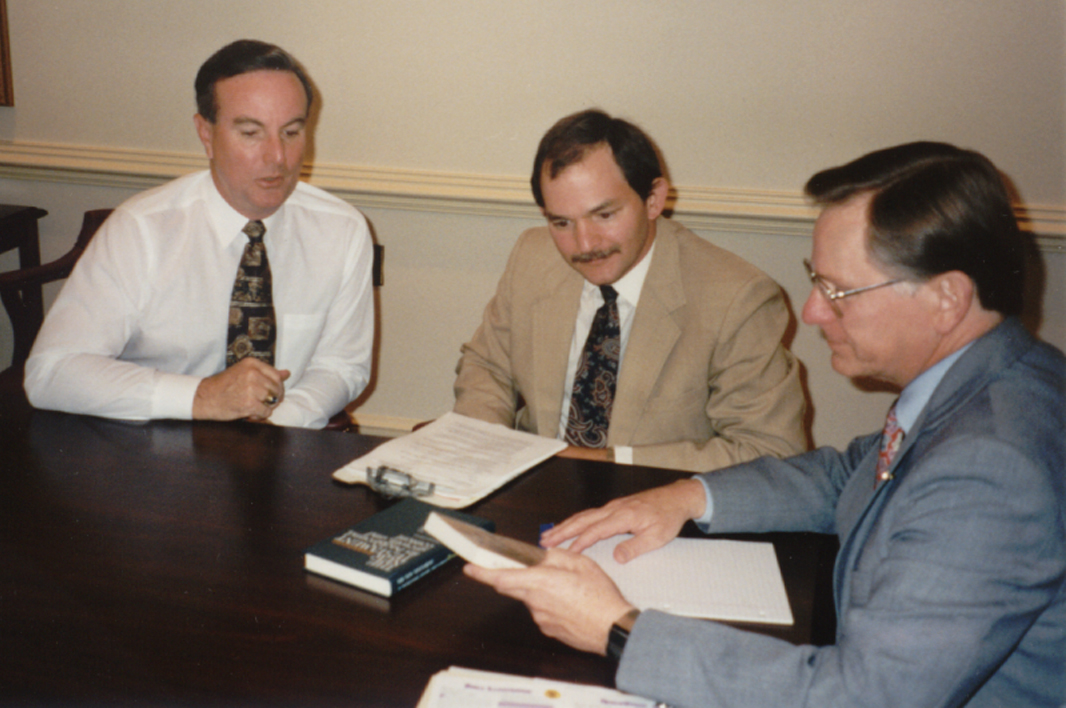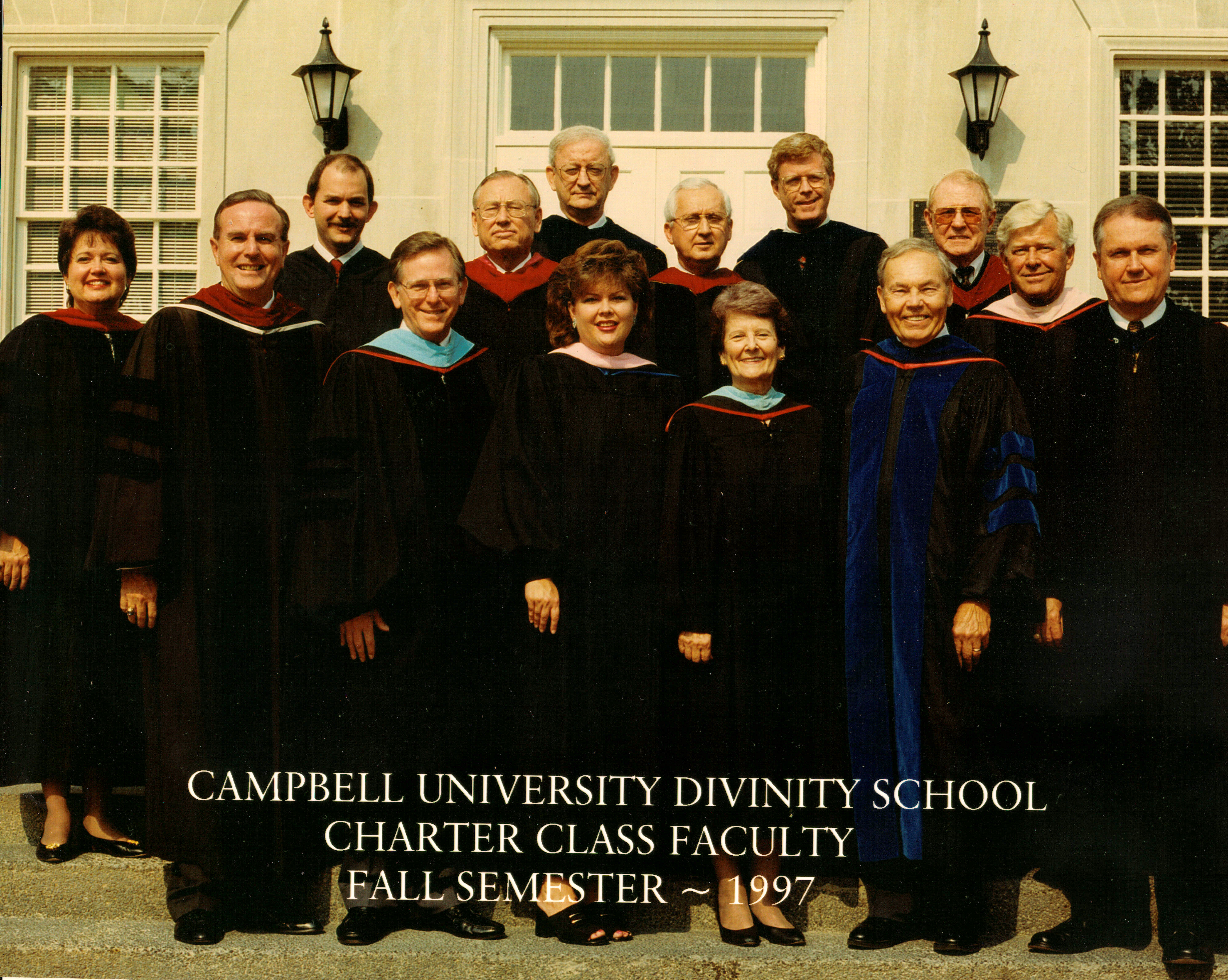Developing the Vision

The idea of educating church leaders in the context of a liberal arts university was not a new idea to Campbell, but the fulfillment of a dream nurtured at the University for many years. Feasibility studies were conducted in 1969 and 1975 to explore the possibility of offering graduate and professional courses in Religion. The decision to add a Divinity School to Campbell’s already existing professional programs in law, pharmacy, education, and business came after a lengthy third feasibility study initiated in 1992. Following considerable research involving discussions with ATS representatives and consultants from seminaries, the study committee recommended that a school based on the forthcoming ATS standards be established. The Campbell University Board of Trustees approved the establishment of its sixth school on September 21, 1995.
University leaders desired to develop a new model of university-based theological education, capitalizing upon the rich resources of a liberal arts environment and the contributions of other professional disciplines. The vision was to educate Christian ministers who would be intellectually prepared, spiritually mature, and capable of inspiring and leading churches to fulfill their unique role in the world.
Founding the School

After a thorough search, the University named Michael G. Cogdill as dean and Bruce P. Powers as associate dean. Soon afterward, the deans announced the recruitment of an outstanding cadre of founding faculty members to help launch the new school. Among these persons were Malcolm O. Tolbert, Thomas A. Jackson, Delos Miles, James W. Good, Ginger S. Graves, Jo Ann Stancil, and Jerry M. Wallace. Clella A. Lee, as a graduate assistant, was instrumental in beginning support services and an assimilation process for new students.
The Divinity School officially opened on August 19, 1996, initially offering elective courses until the beginning of the formal curriculum the following year. Thirty-five founding students enrolled the first year. These students, and those who enrolled in the fall of 1997, constituted the Charter Class of eighty-four students.
Clarifying the Mission
In the days following the announcement of the school and the appointment of a dean and associate dean, the next task was to define the mission and chart the course for the school. The new leaders wanted to frame a mission statement that would express the heart of Christian theological education, one that would be simple and clear to students and churches and bring students and faculty together as a spiritual family, bonded by call, and not regulated by age, race, ender, or denomination. They wanted a mission statement that would keep the school on a healthy course, inspire the faculty and staff in their work, and judge the school if it strayed. Those hours of prayer and work thus formed the mission statement the school proudly proclaims: to provide Christ-centered, Bible-based, and Ministry-focused theological education.
Defining the Curriculum
Preparation for ministry has been changing significantly since the 1950’s. The first shift came as churches began to insist that their ministers be prepared not only to know and preach the Bible but also to work effectively in the areas of leadership, administration, and education. Change was slow, but many divinity schools and seminaries embraced the disciplines of pastoral care, evangelism, church administration, and discipleship development. Others resisted, and insisted that traditional biblical and theological studies were sufficient.
The curriculum in most theological schools provides a balance between the classical studies that focus on knowing and practical studies that focus on doing. However, the needs of people and of churches have continued to change, with questions now being raised about the quality of life, the nature of leadership, and responsibility for ministry among all believers. Consequently, effective theological education increasingly requires an added dimension – a transformational experience that integrates knowledge, attitudes, and skills appropriate for the various contexts in which graduates may serve.
The curriculum developed for the Divinity School is a formation curriculum, designed specifically in response to accrediting standards adopted in 1996 by The Association of Theological Schools. The curriculum is designed to form as well as inform. Students are guided through a nurturing admission process, are commissioned upon their entry into the school, and participate in a revelatory spiritual formation experience throughout the first year. These experiences are enlarged upon during the second year with significant evaluation and mentoring experiences that focus on Christian vocations in a variety of contexts in church and community. Advanced studies and a senior synthesis during the last year enable students to integrate the spiritual vocation facets of their education and assist them in determining personal and professional ministry objectives.
Since the opening of the school in 1996, Campbell Divinity has seen an expansion of programs offered and increased enrollment. Currently, enrollment averages 160 students for each semester. As of graduation in 2016, there are over 650 alumni serving throughout the country and around the world.
Major Milestones in the Divinity School History
| Date | Milestone |
| August 1992 | Feasibility Study Committee appointed to examine need for Divinity School |
| September 21, 1995 | University Trustees voted unanimously to open a Divinity School |
| October 25, 1995 | Public Announcement of the opening of the Divinity School at the Baptist State Convention of North Carolina office in Cary |
| January 1, 1996 | The University named Michael G. Cogdill and Bruce P. Powers as the School’s first Dean and Associate Dean, respectively |
| August 1996 | School opened one year earlier than expected, and Founding Class of 35 students enrolled |
| September 10, 1996 | The first convocation was held to commission the new school, faculty members, and students |
| September 1997 | Charter Class of 84 students admitted |
| October 1997 | Established affiliation with Review & Expositor |
| May 1998 | The Divinity School awarded its first degrees to two transfer students – Timothy Howell and Clella A. Lee |
| August 1, 1998 | Formal agreement established for first global program between Campbell University Divinity School and South Wales Baptist College, University of Wales, Cardiff |
| August 1999 | Divinity School launches Preschool and Children’s Ministry Certificate Program. |
| May 2000 | Graduation of the Charter Class |
| June 2000 | Divinity School awarded Associate Membership in The Association of Theological Schools in the United States and Canada |
| June 2002 | Divinity School awarded full membership and accreditation of all graduate programs by The Association of Theological Schools in the United States and Canada |
| August 2002 | Divinity School launches Hispanic Theological Education Program |
| July 2003 | Divinity School granted approval to award Doctor of Ministry degree |
| August 2004 | Doctor of Ministry Inaugural Class begins |
| July 2005 | Dr. Barry A. Jones named Associate Dean for Academic Programs |
| September 20, 2005 | Commissioning Service and Celebration of the Tenth Year of Classes |
| November 2005 | Divinity School establishes partnership with the Keesee Foundation |
| May 2007 | Graduation of the Doctor of Ministry Inaugural class |
| October 2007 | Established World Religions and Global Cultures Center |
| June 2007 | Received maximum accreditation of ten years from The Association of Theological Schools. |
| October 2009 | Opening and Dedication of Anna Gardner and Robert B. Butler Chapel |
| January 2010 | Divinity School launches Christian Women in Leadership Program |
| July 2010 | Dr. Andrew H. Wakefield named as second Dean of Divinity School |
| December 2010 | Established the Gay T. and Haskell A. Duncan Chair of Music |
| May 2011 | Graduation and Celebration of the School’s Fifteenth Year |
| August 2011 | Dr. Derek Hogan named Assistant Dean for Academic Programs |
| August 2012 | Divinity School launches Master of Arts in Christian Ministry |
| August 2013 | Divinity School launches Certificates in Youth Ministry and Biblical Studies as well as a dual degree MDiv and JD in conjunction with the Campbell University School of Law. |
| January 2020 | Divinity School launches Master of Arts in Faith & Leadership Formation |
| June 2025 | Dr. Barry Jones named as third Dean of Divinity School |
History of Campbell University
Campbell University was founded by James Archibald Campbell, a North Carolina preacher, and has offered quality Christian education since 1887.
Learn more about the history of Campbell